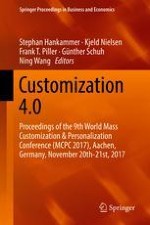2018 | OriginalPaper | Chapter
Exploring Drivers and Barriers for Sustainable Use of Resources: The Case of High-Tech Mass Customizers in the German Textile Industry
Authors : Paula Rassmann, Leontin K. Grafmüller
Published in: Customization 4.0
Publisher: Springer International Publishing
Activate our intelligent search to find suitable subject content or patents.
Select sections of text to find matching patents with Artificial Intelligence. powered by
Select sections of text to find additional relevant content using AI-assisted search. powered by
